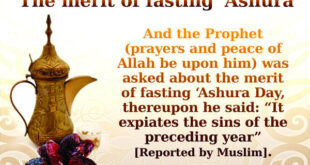The Wisdom in Fasting the Day of ‘AshuraThere are certain days in the year which are more virtuous than others, one such day is the 10th of Muharram which is known as the Day of Ashura, falling in the first month of the Islamic lunar calendar. It is believed the Day of Ashura commemorates various historical events, including the day when Prophet Moses (Musa) and the Israelites were saved from the tyranny of Pharaoh in Egypt. Prophet Muhammad (SAW) observed the Jews fasting on this day to commemorate their deliverance, and he recommended Muslims to also fast. The Prophet (SAW) said: “We are closer to Musa than you are,” and advised Muslims to fast ‘Ashura’ either for three days (ninth, tenth, and eleventh); two days (ninth and tenth); or just the day of Ashura itself. In Islam, Ashura is a solemn occasion, as it marks the martyrdom of Imam Hussein ibn Ali, the grandson of Prophet Muhammad, along with his family members and companions, in the Battle of Karbala in 680 CE. More
Shaykh ‘Abdullah ibn Salih al-Fawzan
Ibn ‘Abbas (رضي الله عنه) narrated that Allah’s Messenger (ﷺ) came to al-Madinah and found the Jews fasting the Day of ‘Ashūrā and he asked about that. They said, “This is the day on which Allah gave victory to Mūsā and Banī Isrā’īl over Fri’awn, therefore, we fast it, exalting it.” Allah’s Messenger (ﷺ) said, “We are more worthy of Mūsā than you are,” and he ordered it to be fasted.
In a report belonging to Muslim, “Mūsā fasted it out of gratitude. And we fast it…”
[Sahih al-Bukhari, no. 3943 and Muslim, nos. 1135, 127 and 128]In the hadith is a clarification of the tremendous wisdom in legislating fasting the Day of ‘Ashūrā and that is to exalt this day and thank Allah, the Most High, for saving Mūsā along with Banī Isrā’īl and drowning Fir’awn along with his people. Due to this, Mūsā fasted, thanking Allah, the Most High, and the Jews fasted it and the followers of Muhammad have more right to follow Mūsā than the Jews. If Mūsā fasted it thanking Allah, the Most High, then we fast it likewise. The Prophet (ﷺ) said,
“We are more worthy of Mūsā than you are.” In another narration,
“I have more right to Mūsā than you.” Meaning: We are more earnest and closer to following Mūsā than you are. We agree with him in the foundations of the religion, believe in his Book while you oppose him in that, change it and distort it. The Messenger (ﷺ) is more obedient and more adhering to the truth than them, thus he fasted the Day of ‘Ashūrā and ordered it to be fasted, establishing and confirming its greatness.
Abū Mūsā (رضي الله عنه) said,
“The Day of ‘Ashūrā was a day the Jews exalted and took as an Eid so Allah’s Messenger (ﷺ) said, ‘You fast it.’” And in one narration, “The people of Khaybar used to fast the Day of ‘Āshūrā and take it as an Eid. Their women used to wear their jewelery and their ceremonial dress so Allah’s Messenger (ﷺ) said, ‘You fast it.’”
[Reported by al-Bukhari, no. 2005 and Muslim, nos. 1131, 129 and 130]It is apparent from this that one of the wisdoms of fasting it is to oppose the Jews by not taking it as an Eid and instead fast on it because the day of Eid is not fasted. This is one way of opposing the Jews on the Day of ‘Āshūrā, another way will follow, if Allah wills, and that is by fasting the 9th day before it.
There are two groups that have gone astray regarding this day:
A group who imitate the Jews. They take ‘Ashūrā as a festive Eid, claiming to spread joy and happiness due to the saving of Mūsā and his people. They display joy by dying their hair and applying kuhl, indulging in spending on the family, cooking food they don’t normally eat and similar actions of the ignorant. They are those who counter corruption with corruption and innovation with innovation.
Another group who take ‘Ashūrā as a day of mourning, sadness and lamenting because al-Husayn ibn Ali (رضي الله عنه) was killed. They display signs of the days of ignorance such as slapping the cheeks, tearing the clothes, chanting sad stories and narrating information which is more lies than truth. The intent behind this is to open the door of fitnah and separate the Muslim nation. This is the action of the one whose efforts have been wasted in this life while he thought he was acquiring good by his deeds.
Allah, the Most High, guided the People of the Sunnah so they do what their Prophet (ﷺ) commanded them, which is to fast while being far from imitating the Jews in that and avoiding what Shaytan beautified of innovations. And all praise and glory is due to Allāh.
اللَّهُمَّ فَقِّهْنَا فِي دِينِنَا، وَارْزُقْنَا الْعَمَلَ بِهِ وَالْاِسْتِقَامَةَ عَلَيْهِ، وَيَسِّرْنَا لِلْيُسْرَى، وَجَنَّبْنَا الْعُسْرَى، وَأَصْلِحْ لَنَا شَأْنَنَا كُلَّهُ، وَاغْفِرْ اللَّهُمَّ لَنَا وَلِوَالِدِينَا وَلِجَمِيعِ الْمُسْلِمِينَ.
O Allah! Give us understanding in the religion, grant us actions according to it and steadfastness upon it; make the easy easy for us and distance us from what is difficult; rectify all our affairs for us; and forgive us – O Allāh, our parents and all the Muslims.
Excerpt taken from the book ‘Ahadith about the First Ten of Dhul-Hijjah and the Month of Allah, Muharram – Rulings and Manners’ by Shaykh ‘Abdullah ibn Salih al-Fawzan
Post Disclaimer | Support Us
Support Us
The sailanmuslim.com web site entirely supported by individual donors and well wishers. If you regularly visit this site and wish to show your appreciation, or if you wish to see further development of sailanmuslim.com, please donate us
IMPORTANT : All content hosted on sailanmuslim.com is solely for non-commercial purposes and with the permission of original copyright holders. Any other use of the hosted content, such as for financial gain, requires express approval from the copyright owners.
 Sri lanka Muslims Web Portal Sri Lanka Muslims News Center
Sri lanka Muslims Web Portal Sri Lanka Muslims News Center
 Donate
Donate
